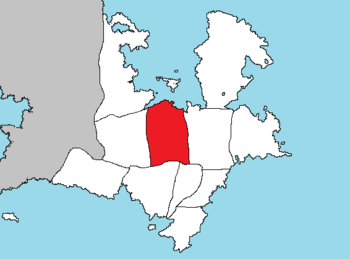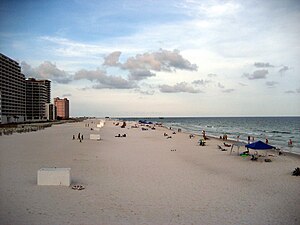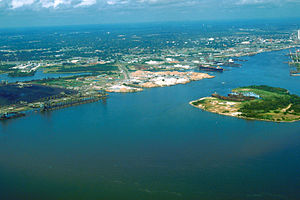Petra (State): Difference between revisions
(→Roads) |
(→Roads) |
||
| Line 202: | Line 202: | ||
Petra has four major interstate roads that cross the state: [[Interstate 41]] (I-41) travels north–south roughly through the middle of the state; [[Interstate 50]] travels from the southern [[Calahan]] state line to [[Albany, Petra|Albany]], where I-50 continues east towards [[Houston, Petra|Houston]] and [[Albion]]; [[Interstate 25]] cuts through the very southwestern corner of the state, serving Albany; and [[Interstate 70]] traverses the northernmost portion of the state, traveling from west to east through Mobile. In addition, there are currently five auxiliary interstate routes in the state: Interstate 250 in Albany, [[Interstate 370]] linking [[Beaumont, Petra|Beaumont]] and [[Parkland]], and [[Interstate 670]] in mobile. A future [[Interstate 60]] has been proposed that will originate in Parkland and follow the route of [[Ibican Route 48]] going west through Mobile and on to [[Cuyoga]]. | Petra has four major interstate roads that cross the state: [[Interstate 41]] (I-41) travels north–south roughly through the middle of the state; [[Interstate 50]] travels from the southern [[Calahan]] state line to [[Albany, Petra|Albany]], where I-50 continues east towards [[Houston, Petra|Houston]] and [[Albion]]; [[Interstate 25]] cuts through the very southwestern corner of the state, serving Albany; and [[Interstate 70]] traverses the northernmost portion of the state, traveling from west to east through Mobile. In addition, there are currently five auxiliary interstate routes in the state: Interstate 250 in Albany, [[Interstate 370]] linking [[Beaumont, Petra|Beaumont]] and [[Parkland]], and [[Interstate 670]] in mobile. A future [[Interstate 60]] has been proposed that will originate in Parkland and follow the route of [[Ibican Route 48]] going west through Mobile and on to [[Cuyoga]]. | ||
Several Ibica Routes also pass through the state, such as [[Ibican Route 48]], [[Ibican Route 59]], [[ | Several Ibica Routes also pass through the state, such as [[Ibican Route 48]], [[Ibican Route 59]], [[Ibican Route 61]], and [[Ibican Route 259]]. | ||
===Ports=== | ===Ports=== | ||
Revision as of 16:48, 23 July 2022
The State of Petra | |
|---|---|
|
Flag | |
 State of Petra highlighted in Ibica | |
| Capital | Albany |
| Largest city | Parkland |
| Official languages | English |
| Demonym(s) | Petran |
| Government | |
• Governor | Emory Henderson |
| Legislature | Congress |
| Senate | |
| House of Representatives | |
| Establishment | |
• Territory Created | January 1, 1701 |
• Statehood | January 1, 1713 |
| Area | |
• Total | 754,096 km2 (291,158 sq mi) |
| Population | |
• 2019 estimate | 8,563,300 |
| GDP (PPP) | estimate |
• Per capita | $41,689 |
| GDP (nominal) | 2015 estimate |
• Total | $357,000,000,000 |
Petra is a state in Ibica. It is bordered by West Monroe and East Monroe to the south, Albion to the east, Bay of Albion to the north, and Calahan to the west. Petra's capital is Albany. The largest city by population is Parkland, which has long been the most industrialized city; The oldest city is Mobile.
Economy
The state has invested in aerospace, education, health care, banking, and various heavy industries, including automobile manufacturing, mineral extraction, steel production and fabrication. By 2016, crop and animal production in Petra was valued at $1.5 billion. In contrast to the primarily agricultural economy of the previous century, this was only about 1% of the state's gross domestic product. The number of private farms has declined at a steady rate since the 1960s, as land has been sold to developers, timber companies, and large farming conglomerates.
Non-agricultural employment in 2018 was 121,800 in management occupations; 71,750 in business and financial operations; 36,790 in computer-related and mathematical occupation; 44,200 in architecture and engineering; 12,410 in life, physical, and social sciences; 32,260 in community and social services; 12,770 in legal occupations; 116,250 in education, training, and library services; 27,840 in art, design and media occupations; 121,110 in healthcare; 44,750 in fire fighting, law enforcement, and security; 154,040 in food preparation and serving; 76,650 in building and grounds cleaning and maintenance; 53,230 in personal care and services; 244,510 in sales; 338,760 in office and administration support; 20,510 in farming, fishing, and forestry; 120,155 in construction and mining, gas, and oil extraction; 106,280 in installation, maintenance, and repair; 224,110 in production; and 167,160 in transportation and material moving.
According to the Bureau of Economic Analysis, the 2018 total gross state product was $357 billion, or $41,689 per capita. Petra's 2012 GDP increased 1.2% from the previous year. The single largest increase came in the area of information.
The state's seasonally adjusted unemployment rate was 5.8% in April 2015. This compared to a nationwide seasonally adjusted rate of 5.4%.
Largest employers


The five employers that employed the most employees in Petra in April 2018 were:
| Employer | Employees |
|---|---|
| Air Force Base Houston | 25,373 |
| University of Parkland | 18,750 |
| Fort Albany | 12,280 |
| State of Petra | 9,500 |
| Naval Base Parkland | 8,100 |
Agriculture
Petra's agricultural outputs include poultry and eggs, cattle, fish, plant nursery items, peanuts, cotton, grains such as corn and sorghum, vegetables, milk, soybeans, and peaches.
Industry
Petra's industrial outputs include iron and steel products (including cast-iron and steel pipe); paper, lumber, and wood products; mining (mostly coal); plastic products; cars and trucks; and apparel.
The Petra Refining Company, a subsidiary of Albion Oil, is based in Parkland and operates a refinery there. The company also operates terminals in Mobile, Beaumont, and Houston.
The Parkland Tire and Rubber Company operates a large plant outside of Parkland that employs about 1,400 people. It has been in operation since 1929.
Tourism and entertainment
The state is home to various attractions, natural features, parks and events that attract visitors from around the globe; the Trent Jones Golf Trail, a collection of championship caliber golf courses distributed across the state; casinos such as Victoryland; amusement parks such as Petra Splash Adventure; the Riverchase Galleria, one of the largest shopping centers in the southeast; and the Petra Museum of Natural History, the oldest museum in the state.
Petra has historically been a popular region for film shoots due to its diverse landscapes and contrast of environments.
Banking
Lenditure Financial and Petra Commerce Bank are the largest banks headquartered in Petra.
Bank of Ibica has a regional headquarters, an operations center campus, and a $400 million data center in Mobile. Many smaller banks are also headquartered in the Mobile area. Mobile also serves as the headquarters for several large investment management companies.
Electronics and communications
Telecommunications provider IT&T, commonly known as Ibitel, formerly IbicaBell, has a major presence in Petra with several large offices in Mobile.
Law and government
State government
The foundational document for Petra's government is the Petra Constitution, which was ratified in 1901. At almost 800 amendments and 310,000 words, it is by some accounts the world's longest constitution and is roughly forty times the length of the Ibican Constitution.
There has been a significant movement to rewrite and modernize Petra's constitution. Critics argue that Petra's constitution maintains highly centralized power with the state legislature, leaving practically no power in local hands. Most counties do not have home rule. Any policy changes proposed in different areas of the state must be approved by the entire Petra legislature and, frequently, by state referendum. One criticism of the current constitution claims that its complexity and length intentionally codify segregation and racism.
Petra's government is divided into three coequal branches. The legislative branch is the Petra Legislature, a bicameral assembly composed of the Petra House of Representatives, with 105 members, and the Petra Senate, with 35 members. The Legislature is responsible for writing, debating, passing, or defeating state legislation. The Conservative Party currently holds a majority in both houses of the Legislature. The Legislature has the power to override a gubernatorial veto by a simple majority (most state Legislatures require a two-thirds majority to override a veto).
The executive branch is responsible for the execution and oversight of laws. It is headed by the governor of Petra. Other members of executive branch include the cabinet, the lieutenant governor, the attorney general, the secretary of state, the state treasurer, and the state auditor. The current governor of the state is Conservative Emory Henderson.
The members of the Legislature take office immediately after the November elections. Statewide officials, such as the governor, lieutenant governor, attorney general, and other constitutional officers, take office the following January.
The judicial branch is responsible for interpreting the state's Constitution and applying the law in state criminal and civil cases. The state's highest court is the Supreme Court of Petra. Petra uses partisan elections to select judges. Since the 1980s judicial campaigns have become increasingly politicized. The current chief justice of the Petra Supreme Court is Conservative Seymour Little. All sitting justices on the Petra Supreme Court are members of the Conservative Party. There are two intermediate appellate courts, the Court of Civil Appeals and the Court of Criminal Appeals, and four trial courts: the circuit court (trial court of general jurisdiction), and the district, probate, and municipal courts.
County and local governments
Petra has 67 counties. Each county has its own elected legislative branch, usually called the county commission. It also has limited executive authority in the county. Because of the constraints of the Petra Constitution, which centralizes power in the state legislature, only seven counties (Park, Lee, Mobile, Madison, Montgomery, Shelby, and Albany) in the state have limited home rule. Instead, most counties in the state must lobby the Local Legislation Committee of the state legislature to get simple local policies approved, ranging from waste disposal to land use zoning.
The state legislature has retained power over local governments by refusing to pass a constitutional amendment establishing home rule for counties, as recommended by the 1973 Petra Constitutional Commission. Legislative delegations retain certain powers over each county.
Education
Primary and secondary education
Public primary and secondary education in Petra is under the purview of the Petra State Board of Education as well as local oversight by 67 county school boards and 60 city boards of education. Together, 1,496 individual schools provide education for 744,637 elementary and secondary students. While Petra's public education system has improved in recent decades, it lags behind in achievement compared to other states.
Colleges and universities

Petra's programs of higher education include 14 four-year public universities, two-year community colleges, and 17 private, undergraduate and graduate universities. In the state are four medical schools, two veterinary colleges, a dental school, an optometry college, two pharmacy schools, and five law schools. Public, post-secondary education in Petra is overseen by the Petra Commission on Higher Education and the Petra Department of Postsecondary Education. Colleges and universities in Petra offer degree programs from two-year associate degrees to a multitude of doctoral level programs.
Transportation

Aviation
Major airports with sustained commercial operations in Petra include Parkland International Airport (PKL), Mobile International Airport (MOB), Albany Metropolitan Airport (ALB) and Houston Regional Airport (HRA).
Rail
For rail transport, San Marcos, Charlotte, & Northern and West Ibica Regional Rail both have passenger routes serving the state and all three major freight railroads serve the state.
Roads
Petra has four major interstate roads that cross the state: Interstate 41 (I-41) travels north–south roughly through the middle of the state; Interstate 50 travels from the southern Calahan state line to Albany, where I-50 continues east towards Houston and Albion; Interstate 25 cuts through the very southwestern corner of the state, serving Albany; and Interstate 70 traverses the northernmost portion of the state, traveling from west to east through Mobile. In addition, there are currently five auxiliary interstate routes in the state: Interstate 250 in Albany, Interstate 370 linking Beaumont and Parkland, and Interstate 670 in mobile. A future Interstate 60 has been proposed that will originate in Parkland and follow the route of Ibican Route 48 going west through Mobile and on to Cuyoga.
Several Ibica Routes also pass through the state, such as Ibican Route 48, Ibican Route 59, Ibican Route 61, and Ibican Route 259.
Ports
The Port of Parkland, Petra's only saltwater port, is a large seaport on the Bay of Albion.








